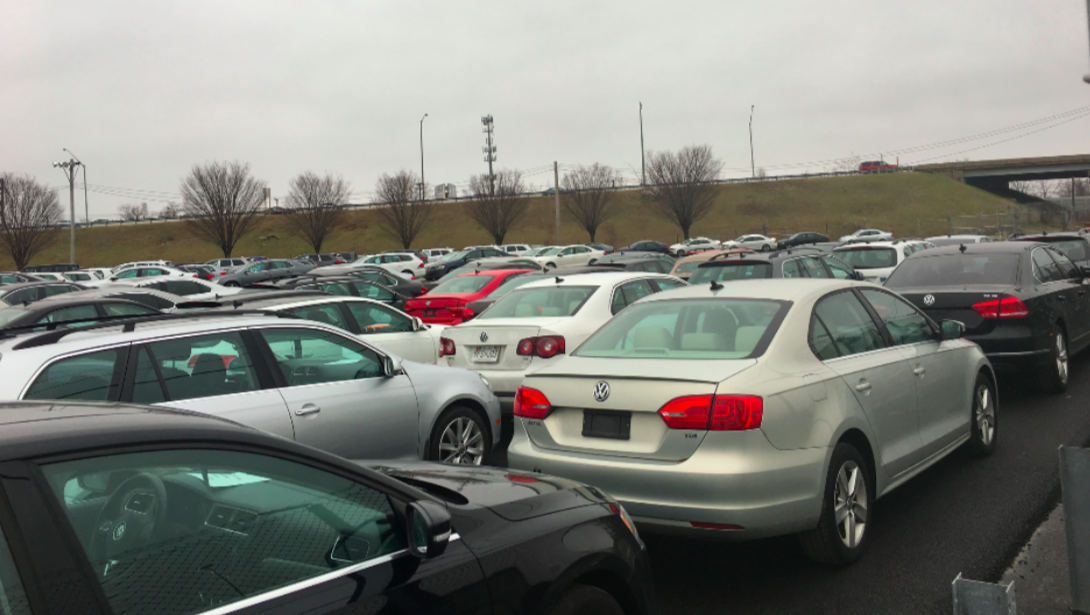Cheating Volkswagen Diesels Have Become A Hot Commodity
After Volkswagen admitted to cheating on the emissions tests of hundreds of thousands of cars back in 2015, the company was forced to buy back the vehicles, modify them to produce fewer emissions but still perform well and resell the cars with a strong warranty. The resulting used VWs are surprisingly compelling, which is why—according to a report from the New York Times—people can't get enough of them.
We've written extensively about Dieselgate—about what VW did, about the details of the settlement and buyback, about how the company stored the vehicles in huge holding lots, and how many folks made small fortunes by buying up cheating diesels. Still, it's been about four years since the scandal broke and three years since the buybacks started, and the topic remains fascinating, with the New York Times providing an update on what's going on with the cheating cars.
It turns out, they're a bit of a hot commodity.
From the Times:
Dealers are eager to get the diesels before the stockpile runs out."We've sold more TDIs back into the market than we took in as buybacks," said Chad Probst, general manager of Vorderman Volkswagen in Fort Wayne, Ind. He said his dealership was selling 50 to 60 of the diesel VWs a month, close to 1,000 total since the buyback."Last year we sold TDIs to all but 12 states. We have people flying from Texas, Florida, the Eastern states," he said. "We definitely don't have to guide customers to the car. They come in asking for TDIs."
That demand, the story says, is driven by the vehicles' impressive fuel economy, the warranty that the government required VW to offer on all re-sold vehicles, and the dearth of other diesel car options on the market.
The news site spoke to a 2015 Golf TDI owner named Mr. Heilbraun, who snagged his car for under $12,000, and who gets some seriously impressive gas mileage. From the story:
Mr. Heilbraun found a 2015 Golf with 38,000 miles on it for about $11,500, a huge savings over what it would have cost new. He now understands the cultish appeal of the cars, known for their turbocharged direct injection diesel engines. "It seems all of the TDI owners have the same opinion: 'I don't want to give up my TDI,'" he said.
Diesel engines have a reputation for lasting hundreds of thousands of miles and for good fuel economy; Mr. Heilbraun gets more than 41 miles per gallon on his daily 30-mile round trip to work, he said.
The second part of the appeal of these cars is the mandatory warranty, which—as we've written before—is actually really nice:
Part of what sold Mr. Heilbraun on a refurbished Golf was the warranty, which is a minimum of four years or 48,000 miles from the emissions repair. It covers parts, labor and taxes on repairs to many crucial systems. "They get good warranties," Mr. Heilbraun said. "Volkswagen kind of has to do that, you know."
The New York Times says VW agreed to buy back almost 380,000 cars, and of those, 100,000 are still for sale. The general manager of Fort Wayne's Vorderman Volkswagen says he thinks that number is really closer to 70,000, that most of the cars available are Passats, and that he anticipates a scarcity of these TDIs, which will make it more expensive for him to buy them.
Speaking of dealers acquiring cars, the New York Times describes how that happens, and also the shape some of the cars are in after having sat for so long:
Volkswagen dealers generally buy the cars at auction then put the "fixed" diesels through the certified pre-owned program, changing fluids and replacing iffy parts.
"I could tell you the cars have been sitting two years," said Rob Barcellona, pre-owned sales manager at Flemington VW, Audi, Porsche in Flemington, N.J. "Every vehicle we see needs brakes and tires. The brakes are rusted, and the tires are dry-rotted." Batteries, windshield wipers, filters and fluids are commonly replaced, and sometimes shift cables are too.
Read the full story at the New York Times; It's an interesting look at how these once vilified automobiles have once again fallen into favor thanks to what what made the vehicles popular in the first place: They are just impressively fuel efficient. Oh, and the government-mandated warranty, too. That helps.
